ESCRS COVID-19 survey Pt 2 Saturday May 9 Commentary by Professor Oliver Findl

Oliver Findl
Published: Monday, May 11, 2020
The ESCRS COVID-19 survey on the practice patterns of ophthalmologists conducted from April 5 to April 24 offers us some valuable insights into the issues which have been addressed by ophthalmologists since the outbreak of the pandemic, writes Professor Oliver Findl, Secretary of the ESCRS.
It is interesting to note (Q 10) that very few ophthalmologists have been transferred to medical wards to help their non-ophthalmological colleagues, except in the UK where this appears to be more prevalent.
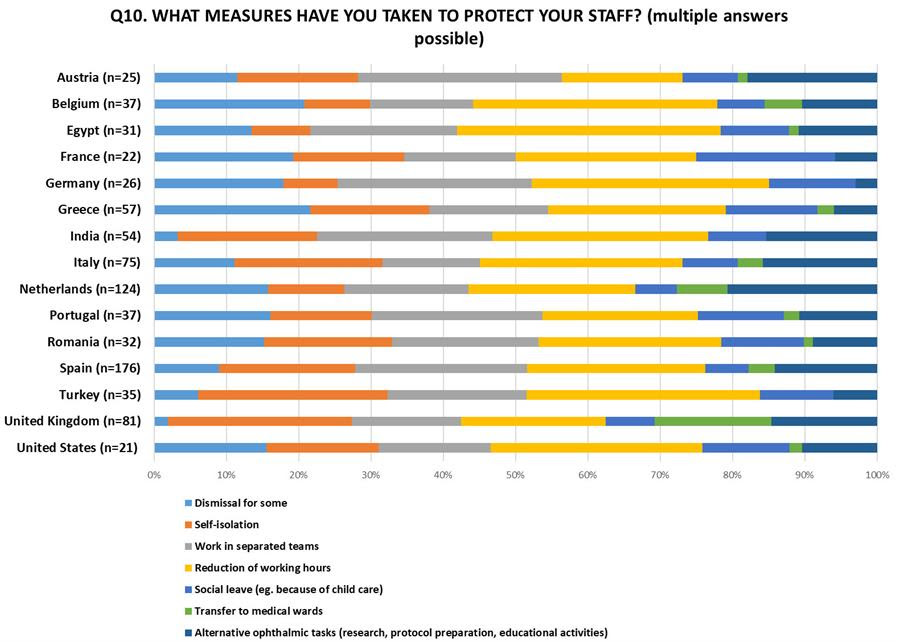 The survey results show that except for hand gloves for patients, most other preventative measures for patients are rather common (Q 13). Interestingly, mouth-nose masks for patients seems to be less commonly used in the Netherlands.
The survey results show that except for hand gloves for patients, most other preventative measures for patients are rather common (Q 13). Interestingly, mouth-nose masks for patients seems to be less commonly used in the Netherlands.
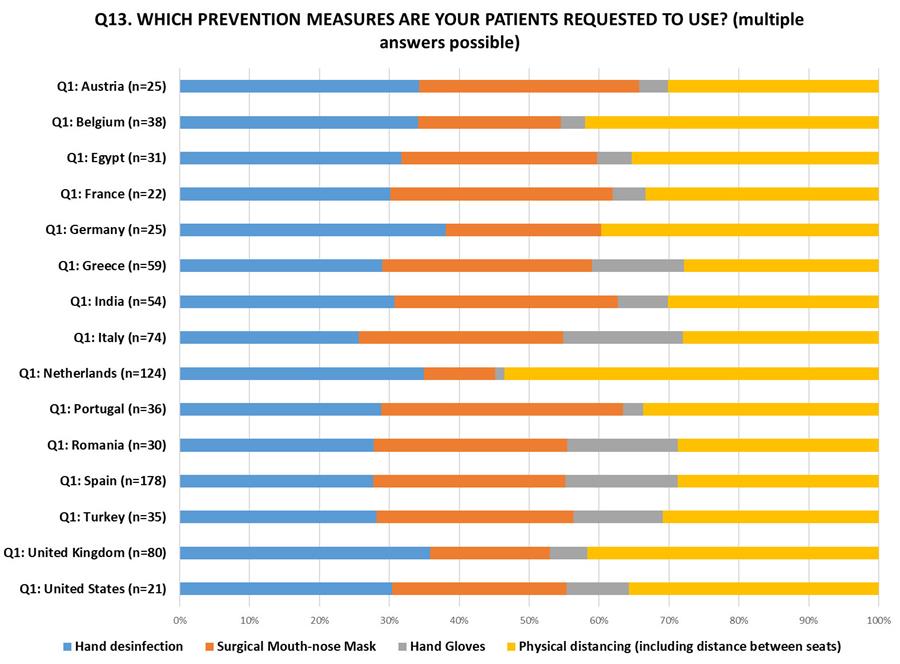 It would seem that FFP1 and FFP2 masks (Q 14) as well as access to testing are not common in all countries even though these would appear to be the most effective. Probably this is due to the lack of availability.
It would seem that FFP1 and FFP2 masks (Q 14) as well as access to testing are not common in all countries even though these would appear to be the most effective. Probably this is due to the lack of availability.
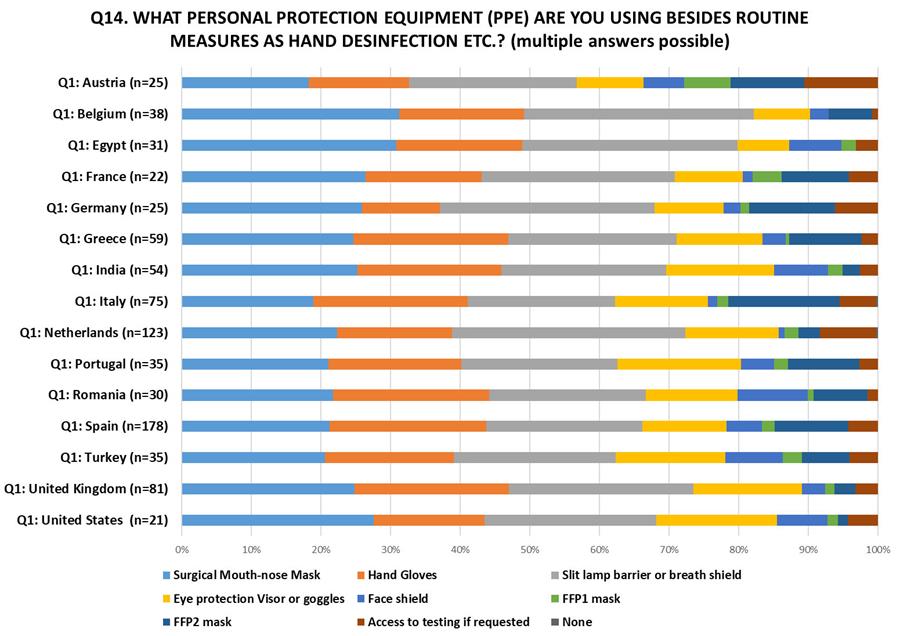 Interestingly, but not surprising we see that countries that are more affected by the virus (Q 15) appear to have more doctors dissatisfied with the availability of PPE.
Interestingly, but not surprising we see that countries that are more affected by the virus (Q 15) appear to have more doctors dissatisfied with the availability of PPE.
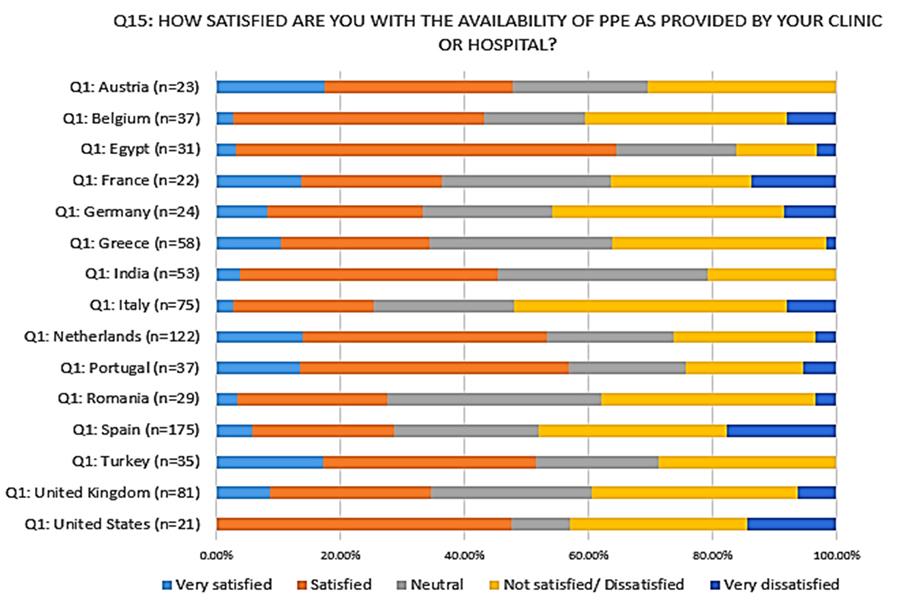 Again, in Q 16 we see that poor access to testing is a major topic in countries most affected by the pandemic.
Again, in Q 16 we see that poor access to testing is a major topic in countries most affected by the pandemic.
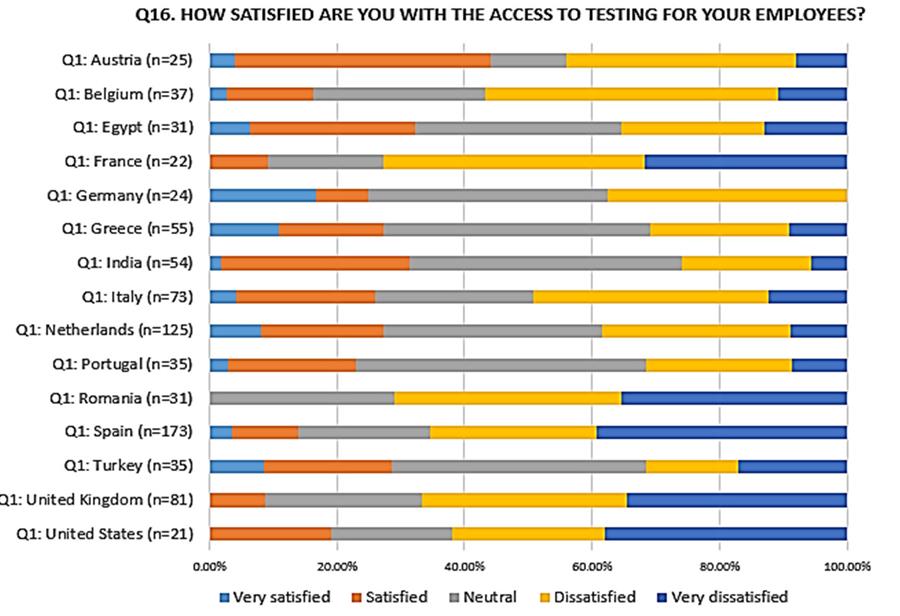 As the lockdown measures in several European countries are being relaxed and ophthalmologists begin to return to work, it is very instructive to see in Q 18 that Phone/Video consulting as well as decreased frequency of examinations after surgery are the predominant behaviour changes which we can expect to see in clinics and hospitals in the weeks and months ahead. Interestingly, there appears to be little enthusiasm for the adoption of bilateral surgery.
As the lockdown measures in several European countries are being relaxed and ophthalmologists begin to return to work, it is very instructive to see in Q 18 that Phone/Video consulting as well as decreased frequency of examinations after surgery are the predominant behaviour changes which we can expect to see in clinics and hospitals in the weeks and months ahead. Interestingly, there appears to be little enthusiasm for the adoption of bilateral surgery.
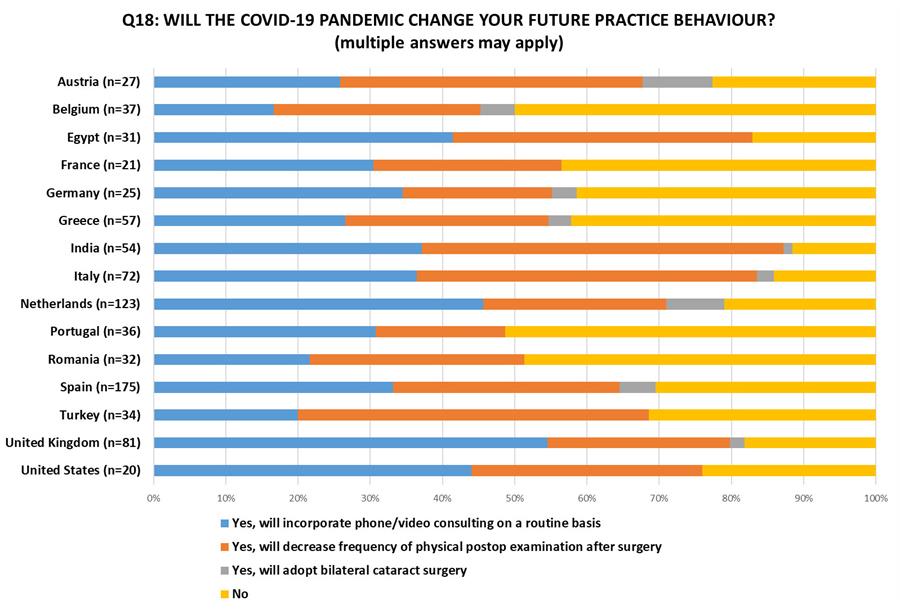 Finally, and maybe surprisingly, there are a large number of ophthalmologists who say they do not plan any changes to their practice.
We cannot predict the future, but I would suggest that our future behaviour may change more substantially than our survey results suggest.
Finally, and maybe surprisingly, there are a large number of ophthalmologists who say they do not plan any changes to their practice.
We cannot predict the future, but I would suggest that our future behaviour may change more substantially than our survey results suggest.
 The survey results show that except for hand gloves for patients, most other preventative measures for patients are rather common (Q 13). Interestingly, mouth-nose masks for patients seems to be less commonly used in the Netherlands.
The survey results show that except for hand gloves for patients, most other preventative measures for patients are rather common (Q 13). Interestingly, mouth-nose masks for patients seems to be less commonly used in the Netherlands.
 It would seem that FFP1 and FFP2 masks (Q 14) as well as access to testing are not common in all countries even though these would appear to be the most effective. Probably this is due to the lack of availability.
It would seem that FFP1 and FFP2 masks (Q 14) as well as access to testing are not common in all countries even though these would appear to be the most effective. Probably this is due to the lack of availability.
 Interestingly, but not surprising we see that countries that are more affected by the virus (Q 15) appear to have more doctors dissatisfied with the availability of PPE.
Interestingly, but not surprising we see that countries that are more affected by the virus (Q 15) appear to have more doctors dissatisfied with the availability of PPE.
 Again, in Q 16 we see that poor access to testing is a major topic in countries most affected by the pandemic.
Again, in Q 16 we see that poor access to testing is a major topic in countries most affected by the pandemic.
 As the lockdown measures in several European countries are being relaxed and ophthalmologists begin to return to work, it is very instructive to see in Q 18 that Phone/Video consulting as well as decreased frequency of examinations after surgery are the predominant behaviour changes which we can expect to see in clinics and hospitals in the weeks and months ahead. Interestingly, there appears to be little enthusiasm for the adoption of bilateral surgery.
As the lockdown measures in several European countries are being relaxed and ophthalmologists begin to return to work, it is very instructive to see in Q 18 that Phone/Video consulting as well as decreased frequency of examinations after surgery are the predominant behaviour changes which we can expect to see in clinics and hospitals in the weeks and months ahead. Interestingly, there appears to be little enthusiasm for the adoption of bilateral surgery.
 Finally, and maybe surprisingly, there are a large number of ophthalmologists who say they do not plan any changes to their practice.
We cannot predict the future, but I would suggest that our future behaviour may change more substantially than our survey results suggest.
Finally, and maybe surprisingly, there are a large number of ophthalmologists who say they do not plan any changes to their practice.
We cannot predict the future, but I would suggest that our future behaviour may change more substantially than our survey results suggest.
Latest Articles
Organising for Success
Professional and personal goals drive practice ownership and operational choices.
Update on Astigmatism Analysis
Is Frugal Innovation Possible in Ophthalmology?
Improving access through financially and environmentally sustainable innovation.
iNovation Innovators Den Boosts Eye Care Pioneers
New ideas and industry, colleague, and funding contacts among the benefits.
Making IOLs a More Personal Choice
Surgeons may prefer some IOLs for their patients, but what about for themselves?
Need to Know: Higher-Order Aberrations and Polynomials
This first instalment in a tutorial series will discuss more on the measurement and clinical implications of HOAs.
Never Go In Blind
Novel ophthalmic block simulator promises higher rates of confidence and competence in trainees.
Simulators Benefit Surgeons and Patients
Helping young surgeons build confidence and expertise.
How Many Surgeries Equal Surgical Proficiency?
Internet, labs, simulators, and assisting surgery all contribute.